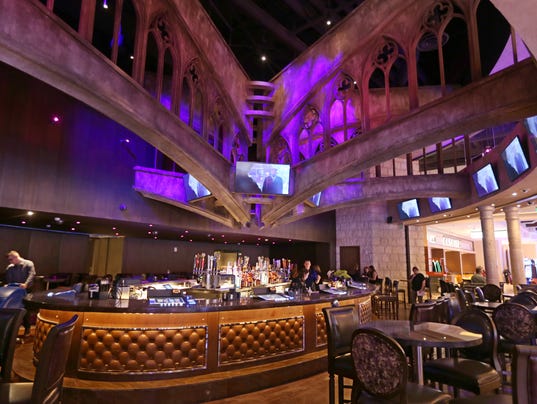Gov. Andrew Cuomo said he's not in favor of bailing out del Lago Casino in Seneca County. Cuomo's remarks came on Wednesday, March 28, 2018. Jon Campbell, Albany Bureau
Del Lago says it will continue to seek state help for its casino, but will it get it?
ALBANY -- Del Lago went bust in its initial bid for a state bailout for its Finger Lakes casino during budget negotiations last month.
But the Tyre, Seneca County, casino said it will continue to lobby state leaders for help as it deals with underperformance and stiff competition from neighboring casinos in just the 14 months since it opened.
The casino continues to put the blame largely on the Seneca Indian Nation, which runs three casinos in the Buffalo/Niagara Falls area and is withholding tax revenue from the state in an ongoing dispute.
"We were disappointed that the budget didn’t address the unfair competitive disadvantage del Lago faces as a result of the outrageous actions of the Seneca Nation," the casino's spokesman Steven Greenberg said Friday.
"The Senecas stopped paying gaming taxes to the state and local governments and used that money to poach del Lago customers with unheard-of promotions."
More: Cuomo rejects bailout for struggling del Lago casino in Finger Lakes
Del Lago casino, struggling with revenue, seeks state bailout
Sports betting in New York? New bill would allow it
Pitch to state continues
The $440 million casino opened in February 2017, but ended its first year with revenues about 44 percent lower than projections.
That led to a push by owner Thomas Wilmot, the Rochester-area mall magnate, to seek a better tax rate from the state during budget talks last month.
"We’re very flexible; just need some kind of relief," Wilmot said when in Albany, adding, "We’re just not hitting the numbers."
The casino pays about 37 percent of its slot revenue to the state, while the Senecas and Oneidas, who run three casinos in central New York, pay 25 percent.
Rivers Casino in Schenectady, another upstate casino that opened in February 2017, is also seeking a better deal from New York after it too failed to meet projections in its first year.
But neither bid was successful: Gov. Andrew Cuomo said he would not support a bailout for the new casinos, and some lawmakers also panned the idea.
The legislative session in Albany runs through mid-June, and del Lago said it hopes it can sway leaders. It employs 1,200 people and has helped the local economy, supporters said.
“We look forward to continuing conversations with state leaders to address this issue," Greenberg continued.
"As we have said, del Lago can compete on an even playing field but not one that’s tipped so heavily toward the Senecas.”
The Senecas have disputed del Lago's claims, saying it is del Lago that failed to meet its own projections.
"That’s their fault, not ours," the Senecas said in a statement March 27.
Can it succeed?
Experts have questioned del Lago's revenue estimates that it provided to the state in order to win a gaming license in 2014.
The competitive nature of the bidding process New York created for four upstate casino licenses may well be at the heart of the problem, said Clyde Barrow, a political science professor at the University of Texas.
Barrow was commissioned in 2014 by an economic group in the Mohawk Valley to study the impact of del Lago on the region.
His estimate of first-year revenue was nearly spot on: He predicted $158 million, and the actual was $147 million.
In its pitch to the state, though, del Lago estimated $263 million.
"I’ve never been a fan of competitive bidding for awarding casino licenses," Barrow said.
"People will come in with astronomical bids in order to secure the license and then they are unable to meet the revenue projections and the forecasts that got that bid."
Del Lago may have estimated more customers leaving other area casinos to visit the new facility than actually has happened, Barrow said.
He said the casino may have to scale down to help its bottomline or even consider bankruptcy if it can't pay its debt.
But del Lago has time, according to Keith Foley, a gaming analyst for Moody's Investors Service.
In January, Moody's warned that if revenue didn't pick up, "del Lago will not be able to achieve a level of performance that can support its existing debt capital structure."
Foley said the debt on the casino — more than $300 million -- isn't due until 2020.
On the other hand, del Lago hasn't shown that it's situation is improving, he said.
"If you build this brand-new thing with all these great amenities and it’s not ramping up very quickly and you’re not so overwhelmed that you have to add more staff, you got yourself a problem," Foley said.
Read or Share this story: https://on.rocne.ws/2GENHXY
| < Prev | Next > |
|---|







 Copyright © 2024 ToCasino.net Online Casino. All Rights Reserved. Designed by
Copyright © 2024 ToCasino.net Online Casino. All Rights Reserved. Designed by